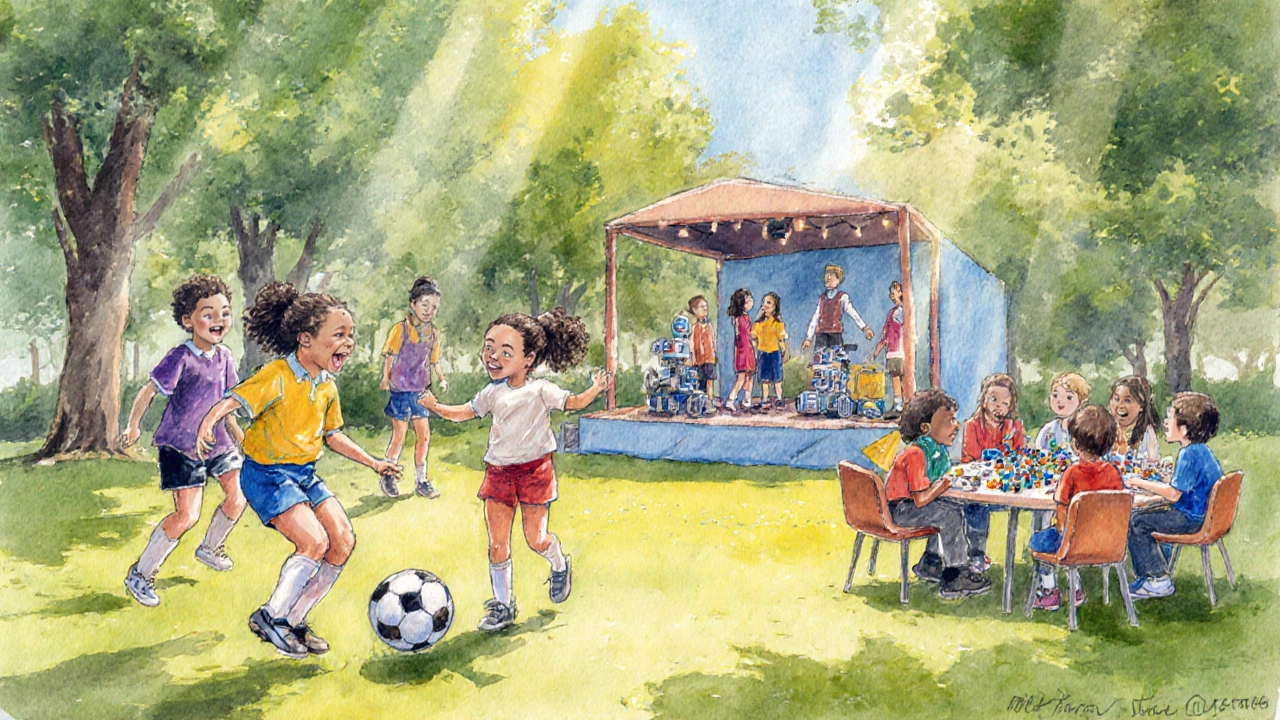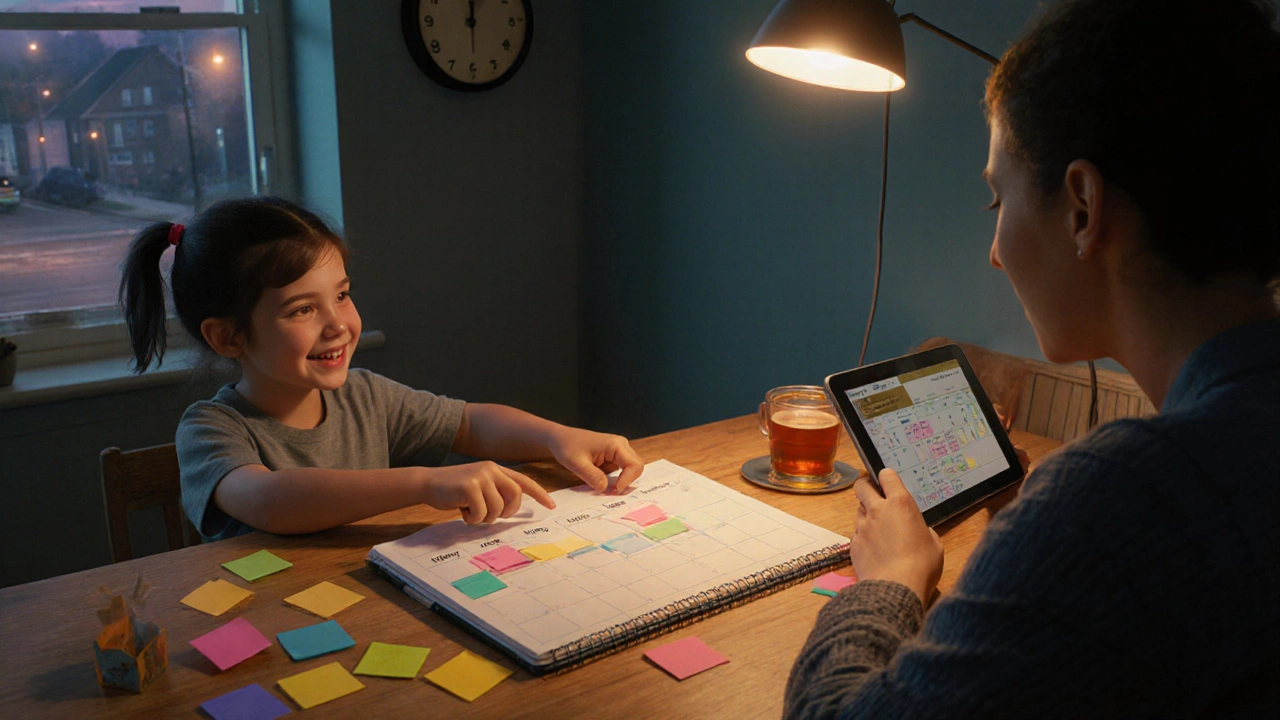After-School Activity Planner
Recommended Activities
Key Takeaways
- Well‑chosen activities improve grades, confidence and physical health.
- They teach social, emotional and time‑management skills that last into adulthood.
- Balance is crucial - too many commitments can cause stress.
- Pick activities that match the child’s interests, schedule and age.
- Parents can guide without taking over, fostering independence.
When parents wonder after‑school activities structured programs that take place outside regular school hours, designed to enrich students' lives, the short answer is yes-if they’re chosen wisely and fit the child’s schedule. In this guide we’ll break down the real benefits, the common pitfalls, and how to pick the right fit for any youngster.
Why after school activities Boost Academic Performance
Research from a UK education think‑tank in 2023 showed that pupils who regularly attend an extracurricular program score on average 0.3grade points higher in maths and English. The boost comes from two main mechanisms.
Academic performance the measurable outcome of a student's learning, usually reflected in grades, test scores and classroom participation improves because many activities reinforce core subjects. A robotics club, for example, teaches coding logic that directly translates to better problem‑solving in maths.
Second, the routine of finishing school, then transitioning to a focused activity, creates a mental “ready‑set” cue that prepares the brain for homework. Kids learn to compartmentalise work and play, which sharpens concentration when they sit down at the desk.
Social and Emotional Benefits
Beyond grades, after‑school programs are social laboratories. Children interact with peers outside their usual classroom clique, learning to negotiate, lead and empathise.
Social skills abilities that enable effective communication, cooperation and relationship‑building such as active listening and conflict resolution are practiced daily in team sports, drama rehearsals and group projects.
Equally important is emotional development the process through which children understand, express and regulate their feelings. When a child faces a missed goal in a basketball game or a challenging line in a play, they experience disappointment, learn resilience, and celebrate successes-building a growth mindset that carries over to academics and later work life.

Physical Health and Fitness
Sedentary lifestyles are a growing concern for UK youngsters. The NHS reports that only 30% of children meet the recommended 60minutes of moderate‑to‑vigorous activity each day.
Participating in physical health the state of bodily well‑being, including fitness, strength and endurance focused activities-football, swimming, dance-helps bridge that gap. Regular movement improves cardiovascular health, bone density and even mental clarity, reducing anxiety and improving classroom behaviour.
Building Life Skills: Time Management and Responsibility
One of the biggest hidden benefits is the chance to practice time management the ability to plan and allocate time effectively to accomplish tasks. Juggling school, homework and a weekly club forces children to prioritise, set realistic goals and develop a personal schedule.
Parental involvement the supportive role parents play in guiding, monitoring and encouraging their child's activities also evolves. When parents shift from “doing” to “supporting”, children gain autonomy, confidence and a sense of ownership over their choices.
Choosing the Right Fit - A Quick Comparison
| Activity Type | Primary Skill Focus | Typical Time Commitment (per week) | Recommended Age Range |
|---|---|---|---|
| Sports (e.g., football, swimming) | Physical fitness, teamwork | 2‑3hours | 5‑16years |
| Arts & Music (e.g., drama, orchestra) | Creativity, confidence | 1‑2hours | 6‑18years |
| Academic Clubs (e.g., robotics, debate) | Critical thinking, subject enrichment | 1‑2hours | 9‑18years |
| Volunteer / Community Service | Social responsibility, empathy | 1‑3hours | 10‑18years |
Match the activity’s focus with your child’s interests. A child who loves storytelling may thrive in drama, while a STEM‑enthusiast might benefit more from a robotics club.

Managing the Schedule - Avoiding Burnout
- Set a weekly limit: Most experts recommend no more than 2‑3hours of structured activity per day, including travel time.
- Build in downtime: Free play, reading or simply relaxing prevents chronic stress.
- Check the calendar: Look for conflicts with school projects or family time before signing up.
- Monitor mood: If a child shows persistent irritability or fatigue, reassess the load.
Remember, quality beats quantity. One well‑run club that the child enjoys can be more beneficial than three half‑hearted commitments.
Getting Started - Practical Steps for Parents
- Talk with your child: List their interests and any “must‑try” ideas.
- Research local options: Check schools, community centres, sports clubs and charities for schedules and fees.
- Visit a trial session: Most organisations offer a free first‑time class; observe how your child engages.
- Set clear expectations: Agree on attendance, homework time and any costs.
- Review after a month: Evaluate enjoyment, skill growth and stress levels; adjust as needed.
Following these steps creates a partnership where the child feels heard, and the parent stays informed.
Frequently Asked Questions
Do after‑school activities hurt academic time?
Not when they’re balanced. A 2022 Ofsted report found that pupils with regular, moderate‑intensity activities actually spent less time procrastinating, because they learned to schedule homework around their commitments.
How many activities is too many?
A good rule of thumb is one to two structured activities per week for younger children (ages 5‑10) and up to three for teens, provided there’s still daily free time.
Can after‑school clubs be affordable?
Many councils in England subsidise sport and arts programmes. Look for community‑run clubs, school‑based options, or charity‑driven groups that offer sliding‑scale fees.
What if my child loses interest quickly?
It’s normal to try several activities before finding a good fit. Encourage a trial period, but also listen when they say “I don’t enjoy this”-switching can keep motivation high.
Are virtual after‑school programs effective?
When in‑person options are limited, well‑structured online clubs can still deliver skill development and social interaction, especially for coding, language learning and debate.
